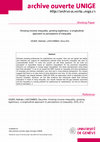Papers by Davy-Kim Lascombes

Although income inequality has been growing in most of the OECD countries since the 1970s, demand... more Although income inequality has been growing in most of the OECD countries since the 1970s, demands for more redistributive policies have stagnated. While many scholars looked at the macroeconomic factors, only a few focused on the cognitive mechanisms behind preferences for redistribution. Building from behavioral and political economists' literature, our two preregistered studies aimed to test how experienced inequalities and self-interest influence individuals’ ideal income distribution. Study one (N=366) used a spectator/worker between-subject experimental design to show that individuals adjust their ideal level of inequality to the one they have experienced. Study two (N=117) tested how self-interest moderates the motive for justice, most notably for individuals benefiting from income inequalities. Studying the inequality gap by combining recent theories and methods from behavioral economics and political sciences not only advance our understanding of how experienced inequal...

Scholars studying preferences for redistribution are puzzled. How can we explain the stable and r... more Scholars studying preferences for redistribution are puzzled. How can we explain the stable and relatively low support for redistributive policies while economic inequality has risen to unprecedented levels? To solve this puzzle, we ask three questions: Do we build our perception of inequalities based on objective inequalities? Do the perceived inequalities influence our willingness to accept larger inequalities? Are these discrepancies rising these last three decades? To do so we exploit the ISSP module on inequality and trace perceptions of inequality and fairness evaluation over time and in cross-national perspective. Our results suggest that there is no clear trend of rising distortions over time. On the contrary, perceptions of inequality rose sharply between 1999 and 2009, an observation which is especially true for top-end inequality. However, we find little evidence that individuals adjust their fairness evaluation in times of rising inequality. Our results indicate that the gap between perceived and fair inequality is a strong predictor for preferences for redistribution, but this its influence tends to decrease over time.

Social Justice Research
A vast literature documents that wealth inequality has risen throughout advanced democracies, esp... more A vast literature documents that wealth inequality has risen throughout advanced democracies, especially the accumulation of wealth among the rich. Yet, instead of increasing wealth redistribution, governments have done the seemingly opposite. Key to understanding why democratic governments do not increase wealth redistribution in times of rising inequalities is to shed light on the public’s preferences. In this paper, we map the public’s redistributive preferences in fourteen countries based on new survey data. We show that traditional socioeconomic cleavages in preferences for wealth redistribution are undermined by diverging mobility expectations. People who expect to climb up the wealth distribution, mostly lower wealth groups, are less supportive of redistribution than people with high stakes of major wealth losses, mainly upper wealth groups. We show that future expectations among the rich and the poor have a highly moderating role for the class conflict over wealth redistribu...
Inequality and Politics is an online survey that was carried out in thirteen West European countr... more Inequality and Politics is an online survey that was carried out in thirteen West European countries and the United States in 2019. The dataset includes representative samples of at least 2000 respondents per country. The survey probes citizens’ perceptions of economic and political inequalities and their attitudes towards “inequality-correcting policies.” This manuscript explains the theoretical motivations behind the survey, describes the dataset and presents some preliminary findings pertaining to five themes: perceptions of economic inequality, normative evaluations of inequality, explanations that respondents give for inequalities, perceptions of political inequality and redistributive policy preferences. Our findings shed new light on the political effects of economic inequality in a comparative perspective.



Uploads
Papers by Davy-Kim Lascombes